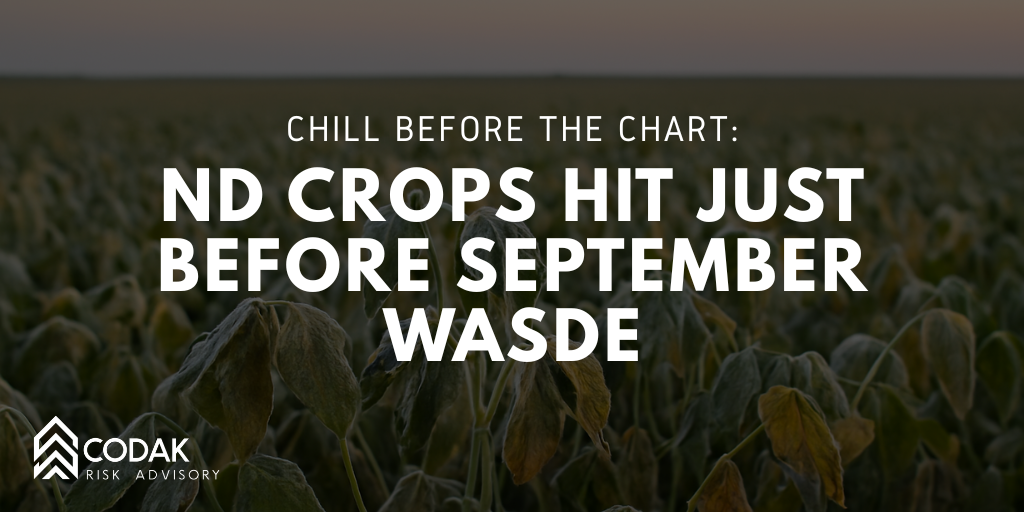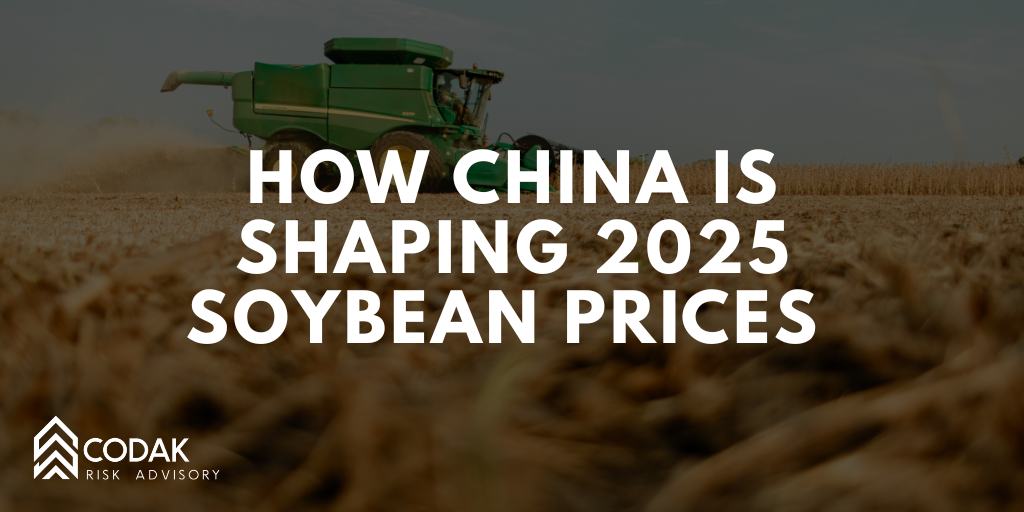
All Eyes on January: Will USDA Confirm Soybean Tightness?
The January USDA report could be a game-changer for soybean markets. With tight carryout projections and key revisions to acres, yield, and crush demand on the table, even minor adjustments could shift the balance. Here's why traders are bracing for impact.

Supplemental Disaster Relief Program (SDRP) Stage 2: What Farmers Need to Know
The USDA has launched Stage 2 of the Supplemental Disaster Relief Program (SDRP) to support farmers impacted by 2023–2024 natural disasters who didn’t receive insurance payouts. This phase includes aid for shallow losses, uninsured acreage, and quality-related crop damage. If disaster hit your farm but insurance didn’t come through, Stage 2 might be the relief you’ve been waiting for.

The Psychology of Grain Marketing and Why Timing Feels Harder Than Ever
Grain marketing is more mental than mathematical. Between FOMO, price swings, and global chaos, timing your sale has never felt harder. Anchoring to old highs or reacting to headlines can derail your strategy. Here’s how psychology shapes your marketing — and what to do instead. Don’t let emotion set your price.

Trade Truce Ripple: Why Soybean Basis Is Shifting Fast
The U.S.-China trade truce and China’s soybean buying promise have already shaken up the market. While only 10% of the pledged volume is confirmed, basis levels have surged in export-focused regions. Crush plants are scrambling to compete, and volatility is on the horizon. Here’s what it means for farmers—and where the opportunities lie.

November WASDE Preview: Don’t Expect Too Much
Markets are buzzing ahead of the November WASDE, but don’t expect dramatic moves. History and limited data could lead to a quiet report. Despite a record soybean yield and weak demand, cash prices have surged. Will the USDA surprise—or stay cautious? Either way, narratives can cost you.

ARC and PLC Payments for the 2024 Crop Year: What Farmers Need to Know
FSA offices have started processing 2024 crop year payments under ARC and PLC programs. While PLC won’t pay out for corn, soybeans, or wheat, ARC-CO payments are likely in counties with lower yields. Here’s what producers need to know about MYA prices and payment eligibility.

Trade Tensions Timeline: September–October 2025
Between September and October 2025, U.S.–China trade tensions swung from optimism to retaliation. From tariff threats to rare earth controls, both sides made bold moves. Behind the scenes, high-level talks continued, culminating in a draft agreement. With a key summit set for October 30, the world watches for a breakthrough. Here's how the past month unfolded.

Harvest Basis Firming: What’s Driving the Shift in Soybean and Corn Markets?
Soybean basis is firming fast in North Dakota and other states, with crush facilities raising bids and offering free delayed pricing. Corn basis is holding unusually steady. The real story? Limited storage and modest yields may be driving this market shift. Farmers should act fast as short-term basis premiums create quick opportunities. Here’s the full outlook on harvest basis firming across the U.S.

When the Report Doesn’t Come: Navigating Grain Markets Without WASDE
The WASDE report didn’t drop this month—and it’s disrupted the usual grain market playbook. But the market hasn’t stopped moving. Basis is still talking, spreads are shifting, and exports offer clues. When the data goes quiet, your plan should speak louder. Here’s how to navigate grain markets without USDA’s usual guidance.

The Delicate Balance of Spreads: What It Means and Why It Matters
Spreads don’t make headlines, but they quietly tell you where the grain market’s headed. When they move, there’s a reason — and if you learn to read them, you’ll spot the story before everyone else does.

Corn Shocks, Wheat Swells, and Soybeans Steady: What the USDA Report Really Says
The latest USDA stock report sent ripples through the grain markets, surprising traders with unexpected figures in corn and wheat. Corn came in higher than expected, wheat overshot estimates significantly, and soybeans stayed mostly on track. Here's a breakdown of what it means, and what to watch next.

Harvest Basis and Storage Strategy: Opportunities Amid Pressure
Harvest soybean basis has slipped well below historic norms, while corn holds steady with strong PNW demand. Storage strategies are key as market carry offers profitability for deferred delivery. With damaged bins and soybeans filling farm storage, space is tightening fast. Locking in basis or cash contracts could make the difference this season. Maximize harvest success by capturing carry and managing bin space wisely.

Marketing Grain Like Grandpa Never Could
Grain marketing has evolved far beyond the gut instincts of generations past. Today, advanced tools bring real-time data and strategy to your fingertips. This isn’t about abandoning tradition—it’s about enhancing it. Learn how to market smarter, not harder. Be the innovator your Grandpa would be proud of.

Chill Before the Chart: ND Crops Hit Just Before September WASDE
Unexpected frost in North Dakota has caused more crop damage than initially reported — especially to soybeans, which are already facing tight carryout estimates. As we look ahead to Friday’s WASDE report, recent history reminds us that early yield optimism often fades. Are we due for another revision walk-back?

Crop Insurance Impacted by: One Big Beautiful Bill Act
The One Big Beautiful Bill Act (OBBBA) is rewriting crop insurance rules in favor of farmers. From bigger subsidies on ECO/SCO to expanded support for Beginning Farmers and Ranchers, the changes make higher coverage levels more accessible. Here’s what you need to know to adapt your crop insurance decisions moving forward.

Will PNW Corn Shipments Fill the Void Left by Chinese Soybean Purchases?
Uncertainty hangs over U.S. soybean exports as the August 12th Chinese trade deadline approaches. With no new crop purchases and weak basis levels in ND, farmers face tough decisions. Will China re-enter the market, or will the U.S. need new trade routes? Explore what lies ahead for the soybean sector. Timing and strategy are critical as harvest nears.

Put Price in Perspective: Soybeans, Corn, and the Road Ahead
In a season marked by uncertainty and tight margins, understanding where soybean prices stand—historically, seasonally, and strategically—is more critical than ever. With harvest near and weather risk fading, zooming out might offer the clarity farmers need to make confident moves. When it comes to price, perspective is profit.

How China Is Shaping 2025 Soybean Prices
China remains the single biggest influence on global soybean prices in 2025. With over 60% of global imports, its demand—and sourcing choices—drive U.S. price swings. From hog herd recovery to geopolitical tensions and Brazil’s expanding role, understanding China is crucial for farmers navigating today’s market.

U.S. Soybean Exports & ND Harvest Basis: Navigating Trade War Uncertainty
Uncertainty hangs over U.S. soybean exports as the August 12th Chinese trade deadline approaches. With no new crop purchases and weak basis levels in ND, farmers face tough decisions. Will China re-enter the market, or will the U.S. need new trade routes? Explore what lies ahead for the soybean sector. Timing and strategy are critical as harvest nears.

Buy Back Your Time: Delegate Your Marketing and Focus on Farming
Farming is demanding work, and marketing shouldn't steal your time. Inspired by Dan Martell’s Buy Back Your Time, this post shows why delegating your grain marketing is a smart move. Discover how outsourcing can reduce stress, boost profits, and let you focus on what you do best: farming. It’s not about doing more — it’s about doing what matters most.
